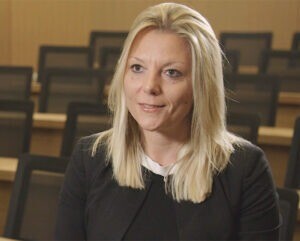Building on engineering success
While sound technical knowledge will take an engineer so far in their careers, an Executive MBA provides the wide-ranging business knowledge and skills to help you advance to a senior management level and steer teams and organisations towards success.
Explore our programme structure
Leadership skills for tackling the big issues
Hear our participants, alumni and faculty talk about their experiences on the Cambridge Executive MBA.

I hope to use what I learnt to shape the future of the space industry.
Why study an Executive MBA at Cambridge?
Cambridge is a centre for technology, engineering and biotech
The region surrounding Cambridge is sometimes referred to as Silicon Fen because of the large cluster of high-tech businesses focusing on software, electronics and biotechnology. Many of these companies have links to the University.
Being a member of Cambridge Judge Business School offers tremendous networking opportunities within the School, the University and Colleges, and wider Cambridge environment. Linking up ideas with business angels and venture capital companies is important in the formation of new ventures – something that happens a lot in Cambridge.
Designed to work around your life
The Executive MBA is delivered over 16 weekends and 4 week-long blocks over a 20-month period, making it a feasible commitment for the busiest professionals. It is a demanding schedule, but the coursework involved is designed to complement your organisational responsibilities, as the programme encourages you to apply what you learn to your own role and organisation.
The weekend format ensures that you can maintain a work-life balance and family responsibilities alongside your study schedule.
Access to an unparalleled network
The programme offers the opportunity for you to network with peers in your cohort and with the Cambridge Judge Business School community. You will also have access to the huge networking potential of the wider University: its students, academics and alumni.
EMBA participants benefit from unparalleled opportunities to engage with and learn from innovators, entrepreneurs and business leaders who contribute to the programme as guest speakers, mentors and coaches.
Meet Executive MBA alumni working in engineering

Mian Langellier, Technical Lead/Design Manager, Balfour Beatty

Gordon Hollingworth, Director of Software Engineering, Raspberry Pi
My name is Shirley Okere. I currently work for Pfizer Biopharmaceuticals. I’m based in the UK. And what I do at Pfizer is I am the Director for Quality. And that’s supporting the quality operations function of the organisation. What excites me the most about what I do is the fact that I am supporting operations which enable valuable and required medicines to get to patients essentially.
So the role I do in supporting operations means that every activity that is required to get medication manufactured, checked, in the right state, is completed to the right standards. And that enables the patient to get a medicinal product that works for starters, that’s safe– and that’s the right products for them. Having spent some time growing up in West Africa, where my heritage lies, I was exposed to situations where perhaps there wasn’t the availability of good quality medication accessible to people across all classes. So I would say I was inspired by my environment. I was inspired by curiosity around how the medication works.
And I was inspired by wanting to do better and wanting to be part of being able to provide medication for people at large. As far as gender diversity goes and improving representation of women in executive leadership positions, I think there needs to be a holistic approach that looks at the pipeline– so looking at girls in schools being more engaged and interested in STEM subjects. And secondly, looking at a recruitment process, is showing that the recruitment process doesn’t necessarily have any inherent biases that might dissuade or might lead to women not being admitted into certain roles in the organisation.
And once the women are in the organisation, that the environment is conducive and takes into account nuances like women having to step back to start a family, for instance, making sure that when they do come back into the work-fold that the environment is conducive for them to continue to progress and they don’t stagnate. In the C-suite, for instance, if you do have a champion for gender diversity at that level– that that will encourage a discussion on how it aligns with business objectives and that will philtre through and ensure there’s enough resource that supports the agenda for gender diversity across organisation. And I think that that should be a more holistic approach. It’s not one solution– idea.
You probably need to start from the kind of grassroots level and work your way all the way to the top, ensuring the right support at each stage. I was at a point in my career where I felt I definitely wanted to further my education firstly. So it was a choice between something like an MBA, which is much broader in its remit, or a more focused– perhaps a science-focus– advanced degree. And after much deliberation, I settled on an MBA. And that was because I felt like, at that point in my career, I wanted a broader understanding of the organisation.
And I wanted to prepare myself for executive leadership positions. The Cambridge Executive MBA programme has definitely equipped me with a number of skills. It’s given me a tool box, so to speak, to approach leadership in a more holistic manner. Those new tools obviously, and those new skill sets, helped enhance the skills I came onto the course with and have really put me in a strong position in terms of understanding what the organisation requires of me in providing leadership and direction to the people that I am expected to lead.
And it does that, because in addition to the soft subjects like organisational behaviour, for instance, or leadership skills, it’s given me a greater amount of exposure and knowledge of the harder subjects like the finance and the accounting. So it enables me to connect the dots and have a more holistic approach to leadership. In terms of balancing life outside of the MBA with the demands and expectations of the course, I can understand how that can be a challenge. It’s 20 months off of hard work, and a lot of input is required from an academic mental perspective.
I do think the structure of the course helps to provide some balance. I found when I was applying for MBA programmes that the structure of the course, which allows us to be here at the Judge Business one week every month, helped me greatly in terms of maintaining balance between my work life and personal life and the actual studies. What’s important is to have structure and to ensure you ringfence some time to focus on the study. That will help strike balance, because the expectations in terms of that time are known to the people you need to spend time with. And it just enables you to make sure you set aside time for your life and your work as well.
What I found very useful about the way we were grouped on the programme was that firstly we where working as part of different groups throughout the programme. And secondly, within the groups, there was diversity in terms of the industries my fellow peers worked in. So that enabled us to learn from our peers, who had different perspectives on the same subject, and gain a broader perspective in so doing of that subject or topic. The lectures really prompted discussions with the different groups and the different kind of industry sectors on the same subject. So the dynamics of working in a group were that that, as part of a large cohort, was part of individual groups was quite unique, and actually facilitated the learning outcomes.
As a woman who has recently completed the MBA programme, I will advise any women considering taking the programme– it will help kind of confirm your existing abilities. It would also give you a broader perspective, which can be useful, especially considering a disparity in the corporate world as far as gender diversity goes. And it also just gives that added confidence for women in an environment, which perhaps might be male dominated, to progress, to apply for roles, and to have the confidence execute the current roles there in. So as a woman said to me and as one who has been through the course, my advice would be for any woman out there considering it to go for it.

Cristina Savian, CEO and Founder, BE-WISE
Connect with us at an event
Meet the Admissions Team and programme alumni at an upcoming information event.
Join a virtual Q&A with our Executive MBA admissions team and ask everything you would like to know about the programme.
Join a virtual Q&A with our Executive MBA admissions team and ask everything you would like to know about the programme.
Join us in Cambridge for an in-person information session to learn more about the Cambridge Executive MBA.








